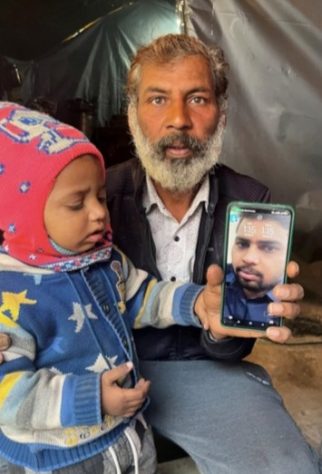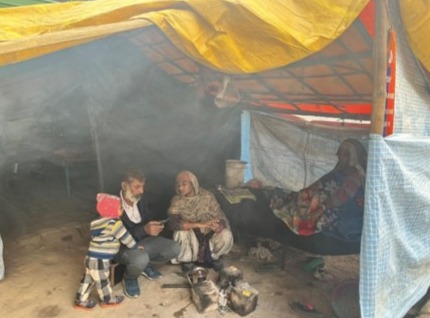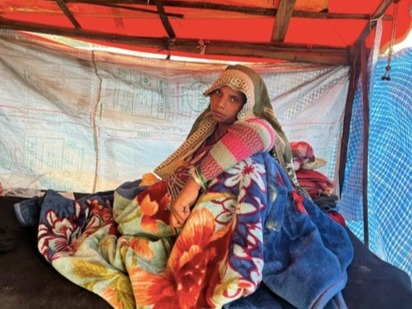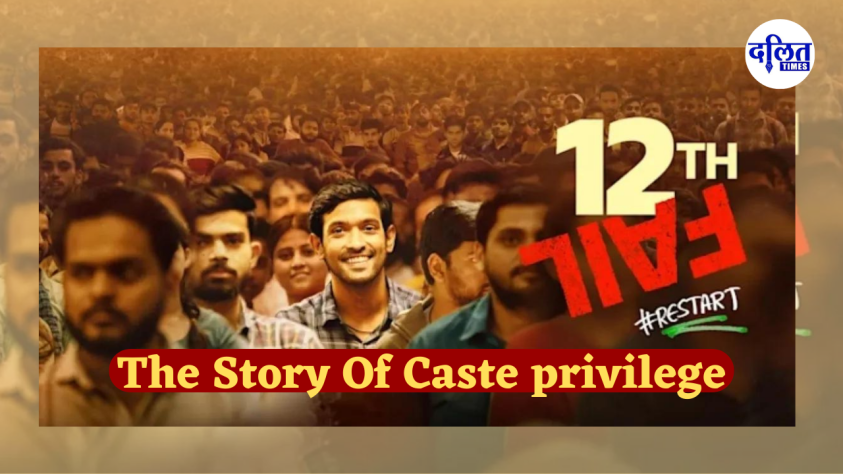Suraj Lohar, 24 was working as a security guard at Delhi Jal Board (DJB) in Delhi’s Karkardooma, his father Mahendra told The Dalit Times. However, over time his bosses told him to start going down septic tanks.
Ground Report By : Nikita Jain
Mahendra Lohar is sitting in a makeshift, while a small fire burns in between to keep him and his family warm. Lohar, 48 lost his young son in November 2024 in a sewer related accident. However, till now he and his family wait for justice. In Delhi, families are still reeling with the loss of losing their loved ones in sewer related accidents, raising questions on Delhi government’s claims on them working on ending the practice of manual scavenging in Delhi. Suraj Lohar, 24 was working as a security guard at Delhi Jal Board (DJB) in Delhi’s Karkardooma, his father Mahendra told The Dalit Times. However, over time his bosses told him to start going down septic tanks. “We are a poor family who migrated from Rajasthan for a better life. When Suraj saw an opportunity to earn a bit of money, he took that,” the broken father said. It was on 4 November 2024 that Mahendra found Saroj’s dead body deep inside a septic tank in the JBL plant. “He used to come home by 6 pm but that day he was an hour late. I along with my brother went to the plant to see where he was and saw that the gates were locked. We jumped through the gates and went inside. I had a bad feeling and I started looking at underground tanks and there he was 12 feet down in a septic tank,” Mahendra recalled.

He also said that when he found Saroj a white foam was coming out his mouth. “We took him to a government hospital and they declared him dead. They did not even do anything to help him,” he added. A degrading practice, manual scavenging required a person to “manually cleaning, carrying, disposing of, or otherwise handling, human excreta in an insanitary latrine or in an open drain or sewer or in a septic tank or a pit”. The practice was banned in India but is still commonplace, with people forced into it because of rigid caste rules and the lack of other livelihood options. They are hired by local corporations and even private contractors to clean sewers and drains that are blocked because of mud and plastic. The Prohibition of Employment as Manual Scavengers and their Rehabilitation Act, 2013, bars hazardous cleaning, but there is no specific ban on manual cleaning of sewers and septic tanks as long as protective gear is given. The law specifies 44 types of protective gear, including breath mask, gas monitor and full body wader suit. Suraj too, he was hired by a private contractor on behalf of DJB. The DJB is the primary authority responsible for the capital’s sewage system and is governed by the Delhi government, in this case – Aam Aadmi Party (AAP). Sunita Lohar is a frail looking woman who is sitting beside her husband Mahendra and tears keep flowing from her eyes. Mother of Suraj, she is still not able to believe they have lost their son. Cursing the system, she said, “I lost my son and none of these people are doing anything. From police to the Jal Board officials, no one has taken any action. My son died and his accused roam free,” she said.

Mahendra also said that while he was forced to become a sanitation worker, he asked those in authority about it and was threatened that he would be fired, due to which Suraj kept doing the job. The family has also accused five men including Delhi Jal Board officials and private contractors for the incident. “He was paid Rs. 8000, which we came to know was low as they used to take cuts from his salary,” Sunita alleged. Historically from a family that collects iron, Lohar family hails from Rajasthan. Traditionally they used to make materials with iron, however they were forced to migrate to Delhi years back to earn a proper living. Their son, Suraj joined Delhi Jal Board when he was 20. Since then, he worked there diligently. The family are living in a makeshift tent at Karkardooma JJ clusters located opposite the district court. Suraj’s wife Komal, had given birth to their second son just 15 days back. She was pregnant at the time of Suraj’s death. “We can’t tell how difficult life has become for us. We had to take loan for the delivery. We literally took Rs. 10 from here and there,” Sunita added, as Komal looked on with tears in her eyes.

Since the death of his son, the five men, who the police had initially arrested, were released and no investigation or interrogation has happened since, according to the family. According to a report by the Indian Express, over the past 15 years, a total of 94 people has died while cleaning sewers in Delhi. However, out of those 75 deaths, for which records are available, only one case has led to justice for the victims in the form of a conviction in court, according to an RTI filed by the newspaper. Mahendra and Sunita have said that no officials have visited them and they have also received no compensation from the government. “It is not even about the money. We are going to fight for justice for my son. No amount of money they give us will shut us up,” Mahendra added. Suraj has left behind his parents, a wife and two children aged 2 years and 15 days.



